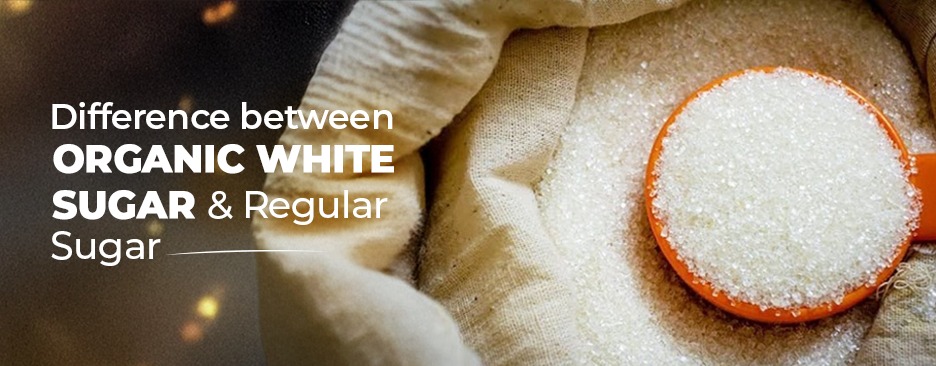While most will know to reduce how much processed sugar they’re consuming, few people understand why or the difference between one type of white sugar and another.
Regardless if you are a baker, a beverage brand, or just trying to eat cleaner, it is useful to know the difference between these two sweeteners so you can make better informed decisions. In this blog, we break down the differences between organic white cane sugar and the refined white sugar you’ll find on supermarket shelves.
1. The Source: Organic vs. Conventional Farming
At a fundamental level, the principal dissimilarity between organic white sugar and regular sugar is rooted in the growing methods for the sugarcane crop. Organic white sugar originates from sugarcane grown under certified organic farming methods. This means there are no synthetic pesticides, no genetically modified organisms (GMOs), and no synthetic fertilizers at all. At Pure Life Organic Foods, our sugarcane is sustainably grown by Pure Life certified farms that employ strict environmental and health standards.
Regular white sugar, however, comes from sugarcane and sugar beets that have been grown under conventional conditions. This means the sugarcane and/or sugar beets may have applied to them, chemical pesticides and herbicides, and as it relates to sugar beets, super often they are genetically modified.
These differences at the root level set the stage for everything that follows—from purity to health benefits.
2. The Processing: Chemical-Free vs. Chemical-Heavy
Processing is where the distinction becomes even more obvious. Organic white cane sugar is refined without the use of harmful processing aids such as sulphur dioxide, bone char, phosphoric acid, or bleaching agents.
At Pure Life Organic Foods, our organic white sugar is processed using sustainable techniques that maintain the sugar’s natural character while ensuring food-grade purity. It retains its pristine white color and fine, lustrous texture—without sacrificing health or ethical standards.
On the other hand, regular white sugar is typically refined using chemical bleaches and filtration agents like bone char, which may raise concerns for vegans and ethically minded consumers. These additives are used to enhance whiteness and texture but leave behind a more processed, less natural product.
3. Taste and Texture: Subtle But Noticeable
Though the taste difference may be subtle to the average palate, organic white sugar tends to have a slightly more nuanced flavor, free from any chemical aftertaste. It dissolves easily and blends well into recipes, making it a favorite among chefs and health-forward brands.
Organic white cane sugar is especially prized in recipes where purity and a clean flavor are essential—like organic lemonades, fluffy marshmallows, or premium ice creams. Its free-flowing, molasses-free consistency ensures that your final product remains light in both color and flavor.
4. Health and Safety: Clean-Label Confidence
Organic white sugar offers peace of mind to consumers who care about what goes into their bodies. Since it is grown without synthetic pesticides and processed without harmful chemicals, it is often considered a healthier choice compared to its conventional counterpart.
While it’s important to remember that sugar is still sugar—organic or not—organic white cane sugar is preferred in balanced diets due to its natural origin and absence of chemical residues.
Moreover, Pure Life’s sugar is completely non-GMO and produced under certified organic standards, giving you full transparency and traceability.
5. Environmental Impact: Farming for the Future
One of the most overlooked differences between organic white sugar and regular sugar is their environmental footprint. Organic farming helps preserve biodiversity, improve soil health, and reduce water pollution. It promotes a long-term, regenerative relationship with the earth.
Conventional sugar farming, by contrast, often leads to soil degradation, pesticide runoff, and higher greenhouse gas emissions due to the use of synthetic chemicals and fertilizers. When you choose organic, you support eco-friendly farming practices that benefit not just your health, but also the planet.
6. Cost vs. Value: Is It Worth the Switch?
Yes, organic sugar tends to be slightly more expensive. But that cost comes with significant added value: cleaner ingredients, better health standards, ethical processing, and sustainability.
Whether you’re a food manufacturer aiming for a clean-label product or a home cook wanting to make conscious choices, organic white sugar is an investment in better health, better taste, and a better planet.
Final Thoughts: Why Choose Pure Life Organic White Sugar?
Pure Life Organic Foods is proud to produce the purest organic white cane sugar available without additives, GMOs, and harmful processing aids. Our sugar is more than just sugar; it’s a commitment to purity, sustainability, and well-being.
If you’re ready to make the switch to a clean replacement in your diet or reformulation we encourage you to choose better now.
Take a look at our Organic White Sugar page and see how Pure Life is your trusted source for certified organic 0.sweetener that is clean, ethical, and delicious.


